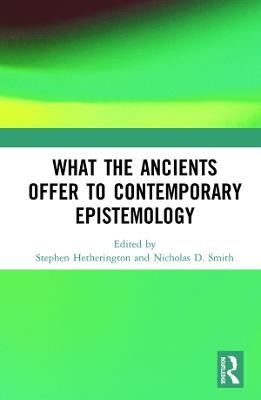
What the Ancients Offer to Contemporary Epistemology
Routledge (Verlag)
978-0-367-36140-2 (ISBN)
Key features:
Blends ancient epistemology with contemporary epistemology, each reciprocally enriching each.
Conceptually sensitive chapters by scholars of ancient epistemology.
Historically sensitive chapters by scholars of contemporary epistemology.
Clearly written chapters, guiding readers at once through central elements both of ancient and of contemporary epistemology.
Stephen Hetherington is Professor of Philosophy at the University of New South Wales, in Sydney, Australia, and Editor-in-Chief of the Australasian Journal of Philosophy. His publications include Epistemology’s Paradox (1992), Good Knowledge, Bad Knowledge (2001), How to Know (2011), and Knowledge and the Gettier Problem (2016). Nicholas D. Smith is the James F. Miller Professor of Humanities in the Departments of Classics and Philosophy at Lewis & Clark College in Portland, Oregon. His publications include Summoning Knowledge in Plato’s Republic (2019), Knowledge (with Ian Evans) (2012), and Socratic Moral Psychology (with Thomas C. Brickhouse) (2010).
Introduction: Ancient Epistemology’s Potential Significance for Contemporary Epistemology 1. Socrates' Version of the Opacity Objection 2. Knowledge-Minimalism: Reinterpreting the Meno on Knowledge and True Belief 3. Plato on Veritism and Value 4. Forms, Exemplars, and Plato 5. Is Plato’s Epistemology about Knowledge? 6. Plato’s Ideal Epistemology 7. Plato on Having a Logos (Theaetetus 201c–210a) 8. Transmitting Understanding and Know-How 9. Aristotle’s Disjunctivism 10. Aristotle’s Virtue Epistemology 11. Aristotle and Scepticism 12. Pyrrhonian Scepticism and Human Agency 13. Academic Justifications of Assent
| Erscheinungsdatum | 27.09.2019 |
|---|---|
| Zusatzinfo | 1 Tables, black and white; 1 Line drawings, black and white; 1 Illustrations, black and white |
| Verlagsort | London |
| Sprache | englisch |
| Maße | 152 x 229 mm |
| Gewicht | 476 g |
| Themenwelt | Geisteswissenschaften ► Philosophie ► Erkenntnistheorie / Wissenschaftstheorie |
| Geisteswissenschaften ► Philosophie ► Philosophie Altertum / Antike | |
| ISBN-10 | 0-367-36140-X / 036736140X |
| ISBN-13 | 978-0-367-36140-2 / 9780367361402 |
| Zustand | Neuware |
| Haben Sie eine Frage zum Produkt? |
aus dem Bereich


![Was heißt Denken?. Vorlesung Wintersemester 1951/52. [Was bedeutet das alles?] - Martin Heidegger](/media/113619842)